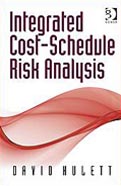Courses Available
by
Hulett & Associates, LLC
Project Management Consultants

Hulett & Associates presents classes in project management disciplines. These classes are presented at your site and can be tailored to your needs.
Please contact us to arrange for the detailed outline and to discuss bringing these courses in to your organization.

- Oracle Primavera Risk Analysis© (Pertmaster) Training - 2 days
- Booz Allen Hamilton Polaris© Training - 2 days
- Quantitative Risk Analysis - 2 days
- Project Scheduling and Schedule Risk Analysis Training - 3 days
- Project Risk Analysis and Management Training - 3 days
- Project Risk Analysis and Management Training - 1 day
- Project Risk Analysis and Management Summary Course - 2 days
- Project Scheduling, Principles and Strategies Training - 2 days
Courses may be tailored to specific requirements.
“Thanks again for a truly wonderful course... You did a great job of revealing to us what really happens when schedules get out of control. I especially appreciated... when you showed us how to estimate schedule risk and how to understand the role played by root causes.“
-- Emile Ettedgui, Senior Analyst, Technomics

Oracle Primavera Risk Analysis©
(Pertmaster) Training - 2 days
Hulett & Associates, LLC Course #001005
Complete Course (2 days, 15 PDUs earned)
“The training is very useful for my day to day work. It explained the concept of Pertmaster and how to extract the result for my project.”
-- Construction Manager, Petronas


Attendees will employ schedule risk analysis techniques, from Monte Carlo simulation of simple schedules to advanced topics, using tools that are available in Oracle’s Primavera Risk Analysis (Pertmaster).
Attendees will summarize the aspects of scheduling that ensure computing the correct critical path and completion dates when durations change. They will discuss the important points about collecting risk data. Using the software and case study schedules provided for the class, they will discover and practice the principles of Monte Carlo simulation-based project schedule risk analysis. The course begins with simple 3-point estimates of duration and one-path schedules, progressing to more advanced concepts (e.g., correlation, probabilistic branching, risk register, risk drivers and integrated cost-schedule risk analysis). Attendees apply these techniques using Primavera Risk Analysis software using prepared files of simple schedules.
This course covers the Quantitative Cost and Schedule Risk Analysis topic in the Quantitative Risk Analysis process of the Risk Management knowledge area, and some basics of the Time Management knowledge area of the PMBOK© Guide from the Project Management Institute.

Booz Allen Hamilton Polaris©
Training - 2 days
Hulett & Associates, LLC Course #001006
Complete Course (2 days, 15 PDUs earned)

There are two versions of this course, for Microsoft Project or Primavera P6 schedules.
Attendees will summarize the aspects of scheduling that ensure computing the correct critical path and completion dates when durations change. They will discuss the important points about collecting risk data. Attendees will employ schedule risk analysis techniques, from Monte Carlo simulation of simple schedules to advanced topics, using simple case studies and Booz Allen Hamilton’s Polaris software. They will discover the principles of Monte Carlo simulation-based project schedule risk analysis beginning with simple 3-point estimates of duration and one-path schedules and progressing to more advanced concepts (e.g., correlation, probabilistic risk and uncertainty.
The course covers importing schedules from P6 or Microsoft Project and risk data from Excel templates. It includes key topics of handling discrete risks and risk drivers, with their probability, impact ranges and assignment to multiple activities.
The software prioritizes the risks to time and cost and analyzing the results for management decisions. The attendees apply these techniques on Polaris software using prepared files of simple schedule files.
This course covers the Quantitative Cost and Schedule Risk Analysis topic in the Quantitative Risk Analysis process of the Risk Management knowledge area, and some basics of the Time Management knowledge area, of the PMBOK® Guide from the Project Management Institute.

Quantitative Risk Analysis
Training - 2 days
Hulett & Associates, LLC Course #001003
Complete Course (2 day, 15 PDUs earned)

Attendees will discover the rationale, benefits, costs and tools of quantitative project risk analysis including decision tree analysis and cost and schedule risk analysis.
The use of decision trees to make decisions in the face of uncertainty is presented for both risk-neutral and risk-averse organizations. It shows how different utility functions can produce different results for organizations with each type of risk attitudes and tolerances.

Sinopec Engineering Group, Beijing
The majority of the course shows simple-to-modern approaches to risk analysis based on Monte Carlo simulation techniques. It starts with simple descriptions of the Monte Carlo method and how to collect high-reliability data about project risk. The course applies these techniques to project cost risk analysis and then proceeds to discuss schedule and integrated cost-schedule risk analysis, with some information about best practice CPM scheduling. It shows how to represent uncertainty including inherent variability, estimating error and bias (common cause risks generally unlikely to be mitigated) and specific project risks (special cause risks that may be mitigated). The project risks are represented by Risk Drivers and that modern methodology is explained. Risk Drivers are prioritized so that risk mitigation can be efficient.
Finally, integrated cost-schedule risk analysis is described. The course explains how integrating and analyzing cost risk with schedule risk analysis yields more accurate and complete cost risk results. Prioritizing schedule risk and cost risk shows that, since schedule risk affects the cost risk of time-dependent resources (e.g., labor, rented equipment), some risks to schedule are also important risks to cost. Risk mitigation, including the cost of mitigation actions, is shown for both cost and schedule.
This course covers the Quantitative Risk Analysis process of the Risk Management knowledge area of the PMBOK® Guide.

Project Scheduling and Schedule
Risk Analysis Training - 3 days
Hulett & Associates, LLC Course #002002
Complete Course (3 days, 22 PDUs earned)

Attendees will demonstrate the principles of project scheduling, from simple forward pass and early dates to advanced use of constraints, resources, calendars, statusing, baseline control and earned value. They will show methods of schedule problem diagnoses and discover scheduling abuses to avoid. They will apply these skills using classroom exercises.
This is a course in principles and is a prerequisite to learning any scheduling software package. Attendees will then discover the concepts of project schedule risk analysis from simple Monte Carlo simulation to more advanced techniques (e.g., correlation, probabilistic branching and conditional branching). They will show these principles on classroom exercises using manual techniques or popular software programs. They will be able to present the issues and techniques for collecting high-quality quantitative risk analysis data.
This course covers the Time Management knowledge area and the Quantitative Schedule Risk Analysis process of the Risk Management knowledge areas of the PMBOK© Guide.

“The extent of the topics that are covered was more than expected. Very good.”
-- Construction Manager, Petronas

Project Risk Analysis and
Management Training - 3 days
Hulett & Associates, LLC course #001001
Complete Course (3 days, 22 PDUs earned)

Project Risk Analysis and Management attendees will demonstrate and apply the six PMBOK© Guide (3rd ed.) processes of project risk management. They will present the purposes and methods of risk management planning and employ both opportunities and threats and the use of the risk breakdown structure in risk identification. They will demonstrate qualitative risk analysis methods of ranking risks by probability and impact and the use of those results to prepare risk response methods. They will employ quantitative analysis methods of cost and schedule risk and decision tree analysis, solving case studies using manual analytic methods. They will observe and be able to explain modern quantitative risk analysis software. They will recognize the characteristics of the mature project risk management organization.
This course covers the Project Risk Management knowledge area of the PMBOK© Guide.

Project Risk Analysis and
Management Training - 1 day
Hulett & Associates, LLC Course #003001
Complete Course (1 day, 8 PDUs earned)

Project Risk Analysis and Management Basic Course attendees will name and define the six PMBOK© Guide (3rd ed.) risk management processes. Attendees will identify the purposes and methods of risk management planning. They will state the benefits of using risk identification for opportunities and threats using the risk breakdown structure (RBS) and brainstorming methods. They will define qualitative risk analysis methods of ranking risks by probability and impact and state how those results lead to alternative risk response methods. They will illustrate quantitative analysis methods of cost and schedule risk and decision analysis.
This course covers the basics of the Project Risk Management knowledge area of the PMBOK© Guide.

Project Risk Analysis and Management
Summary Training - 2 days
Hulett & Associates, LLC course #002001
Complete Course (2 days, 15 PDUs earned)

Attendees will summarize and interpret six PMBOK© Guide (3rd ed.) processes. They will present the purposes and methods of risk management planning. They will discover how to perform risk identification for opportunities and threats using tools including the risk breakdown structure (RBS) and brainstorming methods. They will explain qualitative risk analysis methods of ranking risks by probability and impact and give examples to illustrate alternative risk response methods. They will explain quantitative analysis methods of cost and schedule risk and decision analysis in case studies using manual analytical methods. They will observe modern quantitative method software running. They will recognize the characteristics of the mature project risk management organization.
This course summarizes the Project Risk Management knowledge area of the PMBOK© Guide.

Project Scheduling, Principles
and Strategies Training
Hulett & Associates, LLC Course #001002
Complete Course (2 days, 15 PDUs earned)

Attendees will demonstrate the principles of project scheduling, from simple forward pass and early dates to advanced use of constraints, resources, calendars, statusing, baseline control and earned value. They will show methods of schedule problem diagnoses and discover scheduling abuses to avoid. They will apply these skills using classroom exercises. This is a course in principles and is a prerequisite to learning any scheduling software package.
This course covers the Time Management knowledge area of the PMBOK© Guide.



